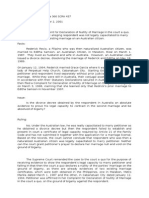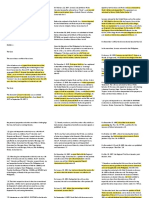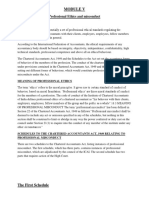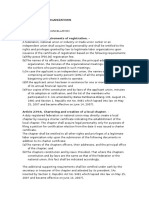San Luis V San Luis
San Luis V San Luis
Uploaded by
chelsimaineCopyright:
Available Formats
San Luis V San Luis
San Luis V San Luis
Uploaded by
chelsimaineOriginal Description:
Original Title
Copyright
Available Formats
Share this document
Did you find this document useful?
Is this content inappropriate?
Copyright:
Available Formats
San Luis V San Luis
San Luis V San Luis
Uploaded by
chelsimaineCopyright:
Available Formats
San Luis vs.
San Luis
G.R. Nos. 133743 & 134029, 6 February 2007
FACTS: During his lifetime, Felicisimo San Luis (Rodolfo San Luiss dad) contracted three
marriages. His first marriage was with Virginia Sulit on March 17, 1942 out of which were born
six children. On August 11, 1963, Virginia predeceased Felicisimo.
Five years later, on May 1, 1968, Felicisimo married Merry Lee Corwin, with whom he had a
son, Tobias. However, on October 15, 1971, Merry Lee, an American citizen, filed a Complaint
for Divorce before the Family Court of the First Circuit, State of Hawaii, which issued a Decree
Granting Absolute Divorce and Awarding Child Custody on December 14, 1973. On June 20,
1974, Felicisimo married Felicidad San Luis, then surnamed Sagalongos. He had no children with
Felicidad but lived with her for 18 years from the time of their marriage up to his death on
December 18, 1992. Upon death of his dad, Rodolfo sought the dissolution of their Felicisimos
conjugal partnership assets and the settlement of Felicisimos estate. On December 17, 1993,
Felicidad filed a petition for letters of administration before the Regional Trial Court of Makati
City. Rodolfo claimed that Felicidad has no legal personality to file the petition because she was
only a mistress of Felicisimo since the latter, at the time of his death, was still legally married to
Merry Lee. Felicidad presented the decree of absolute divorce issued by the Family Court of the
First Circuit, State of Hawaii to prove that the marriage of Felicisimo to Merry Lee had already
been dissolved. Thus, she claimed that Felicisimo had the legal capacity to marry her by virtue
of paragraph 2 Article 26 of the Family Code.
Rodolfo asserted that paragraph 2, Article 26 of the Family Code cannot be given retroactive
effect to validate Felicidads bigamous marriage with Felicisimo because this would impair
vested rights in derogation of Article 256.
ISSUE: Whether or not Felicidad may file for letters of administration over Felicisimos estate.
HELD: The divorce decree allegedly obtained by Merry Lee which absolutely allowed Felicisimo
to remarry, would have vested Felicidad with the legal personality to file the present petition as
Felicisimos surviving spouse. However, the records show that there is insufficient evidence to
prove the validity of the divorce obtained by Merry Lee as well as the marriage of Felicidad and
Felicisimo under the laws of the U.S.A. In Garcia v. Recio, the Court held that presentation
solely of the divorce decree is insufficient and that proof of its authenticity and due execution
must be presented. Under Sections 24 and 25 of Rule 132, a writing or document may be
proven as a public or official record of a foreign country by either (1) an official publication or
(2) a copy thereof attested by the officer having legal custody of the document. If the record is
not kept in the Philippines, such copy must be (a) accompanied by a certificate issued by the
proper diplomatic or consular officer in the Philippine Foreign Service stationed in the foreign
country in which the record is kept and (b) authenticated by the seal of his office.
You might also like
- Geluz vs. Ca - Case DigestDocument2 pagesGeluz vs. Ca - Case Digestchatmche-06100% (2)
- Garcia-Recio vs. Recio 366 SCRA 437Document2 pagesGarcia-Recio vs. Recio 366 SCRA 437Krissie Guevara100% (3)
- Case Digest On Property LawDocument10 pagesCase Digest On Property LawJohann Heinrich100% (6)
- Commonwealth Insurance Vs CADocument2 pagesCommonwealth Insurance Vs CAJackie Bana100% (1)
- Case Digest Family Code!!..Document21 pagesCase Digest Family Code!!..Rv Tenorio33% (3)
- San Luis V San LuisDocument10 pagesSan Luis V San LuisAli BastiNo ratings yet
- DIGEST 06 - Republic Vs OrbecidoDocument2 pagesDIGEST 06 - Republic Vs Orbecidoducati99d3100% (5)
- Yao Kee vs. Sy-Gonzales DigestDocument2 pagesYao Kee vs. Sy-Gonzales Digestsharkeyshirzee100% (4)
- Pilapil Vs Ibay-SomeraDocument1 pagePilapil Vs Ibay-SomeraGelda UyNo ratings yet
- Chi Ming Tsoi DigestDocument2 pagesChi Ming Tsoi DigestGerald Dela Cruz100% (4)
- Chu Ming Tsoi v. Juan BernatDocument1 pageChu Ming Tsoi v. Juan BernatRenesméNo ratings yet
- Garcia vs. Recio Case DigestDocument1 pageGarcia vs. Recio Case DigestJM Bermudo0% (1)
- People Vs PatalinDocument1 pagePeople Vs PatalinJigs Iniego Sanchez SevilleNo ratings yet
- 1 - Mercado v. Ongpin, G.R. 207324, September 30, 2020Document13 pages1 - Mercado v. Ongpin, G.R. 207324, September 30, 2020ACG0% (1)
- Adasa Vs Abalos DigestDocument2 pagesAdasa Vs Abalos DigestLex Ocs0% (1)
- Llorente Vs CA Case DigestDocument1 pageLlorente Vs CA Case DigestPing EdulanNo ratings yet
- People vs. Patalin Et AlDocument19 pagesPeople vs. Patalin Et AlMark Catabijan CarriedoNo ratings yet
- 6 - Nicolas vs. RomuloDocument2 pages6 - Nicolas vs. RomuloAngelo Raphael B. DelmundoNo ratings yet
- Rene Ronulo VS People of The Philippines July 2 2014 GR No. 182438Document2 pagesRene Ronulo VS People of The Philippines July 2 2014 GR No. 182438Belen GaoatNo ratings yet
- Maxey Vs CA Case DDocument3 pagesMaxey Vs CA Case DVince MokeNo ratings yet
- Issue: Whether or Not Co-Partnership Existed Between Plaintiff and Deceased Sabert. Ruling: NODocument1 pageIssue: Whether or Not Co-Partnership Existed Between Plaintiff and Deceased Sabert. Ruling: NOLorelieNo ratings yet
- Ong Vs Ong (Sexual Infidelity or Perversion)Document1 pageOng Vs Ong (Sexual Infidelity or Perversion)Eins BalagtasNo ratings yet
- Crim Art 8 DigestsDocument19 pagesCrim Art 8 DigestsJonathan BravaNo ratings yet
- Te VS Yu-TeDocument2 pagesTe VS Yu-TeDarlene AnneNo ratings yet
- CD Rabadilla vs. Court of Appeals 334 SCRA 522Document2 pagesCD Rabadilla vs. Court of Appeals 334 SCRA 522Mary Fatima BerongoyNo ratings yet
- Mercado vs. Espiritu 37 Phil 215Document1 pageMercado vs. Espiritu 37 Phil 215Hecel LoreenNo ratings yet
- Llorente VS Ca, GR No 124371Document6 pagesLlorente VS Ca, GR No 124371Allyza SantosNo ratings yet
- Case Digest PersonDocument2 pagesCase Digest PersonJoanne Alyssa Hernandez LascanoNo ratings yet
- PP vs. Valeroso, GR # 164815, Feb 22, 2008Document2 pagesPP vs. Valeroso, GR # 164815, Feb 22, 2008Nikay SerdeñaNo ratings yet
- 2017 Case DigestsDocument14 pages2017 Case DigestsAw Lapuz100% (2)
- 16) Tayug Vs Rural BankDocument3 pages16) Tayug Vs Rural BankJohn Ayson100% (2)
- Quimiging v. IcaoDocument7 pagesQuimiging v. IcaoGuinevere RaymundoNo ratings yet
- Beso Vs Daguman Case DigestDocument2 pagesBeso Vs Daguman Case DigestKobe BryantNo ratings yet
- Vda de Jacob Vs CaDocument10 pagesVda de Jacob Vs CajeandpmdNo ratings yet
- Garvida vs. Sales GR No. 124893 April 18, 1997 FactsDocument1 pageGarvida vs. Sales GR No. 124893 April 18, 1997 FactsMczoC.MczoNo ratings yet
- Frenzel Vs Catito GR143958Document2 pagesFrenzel Vs Catito GR143958Pam Otic-Reyes100% (2)
- Republic Vs Orbecido III Case DigestDocument2 pagesRepublic Vs Orbecido III Case DigestKim Arizala100% (5)
- US vs. RuizDocument1 pageUS vs. RuizJude IklamoNo ratings yet
- Frivaldo Vs ComelecDocument1 pageFrivaldo Vs ComelecManu SalaNo ratings yet
- Hapitan V LagradillaDocument4 pagesHapitan V LagradillaKastin SantosNo ratings yet
- Buenaventura V CA DigestDocument1 pageBuenaventura V CA Digestmybernal18No ratings yet
- Republic V Tampus, GR No. 214243, March 16, 2016 FactsDocument2 pagesRepublic V Tampus, GR No. 214243, March 16, 2016 FactsFelix CamerinoNo ratings yet
- Valeroso vs. People of The Philippines G.R. No. 164815, February 22, 2008Document1 pageValeroso vs. People of The Philippines G.R. No. 164815, February 22, 2008Anton AguilaNo ratings yet
- ONG Vs ONGDocument2 pagesONG Vs ONGPrinsesaJuuNo ratings yet
- Garcia vs. RecioDocument1 pageGarcia vs. RecioAna CeeNo ratings yet
- Republic v. Manalo, G.R. No. 221029, April 24, 2018 (Art 26)Document18 pagesRepublic v. Manalo, G.R. No. 221029, April 24, 2018 (Art 26)Kristelle IgnacioNo ratings yet
- PNR V Kanlaon DigestDocument2 pagesPNR V Kanlaon DigestHannah SyNo ratings yet
- Case Digest 1 Nmsmi Vs Military ShrineDocument2 pagesCase Digest 1 Nmsmi Vs Military ShrineAronJames100% (2)
- Miciano vs. Brimo 50 Phil 867Document1 pageMiciano vs. Brimo 50 Phil 867Ross Camille Salazar100% (2)
- Macariola Vs AsuncionDocument2 pagesMacariola Vs AsuncionJennelie jandusayNo ratings yet
- Zapanta V Montesa G.R. No. L-14534 February 28, 1962Document1 pageZapanta V Montesa G.R. No. L-14534 February 28, 1962Emrico CabahugNo ratings yet
- Republic vs. Orbecido III, G.R. No. 154380Document7 pagesRepublic vs. Orbecido III, G.R. No. 154380Jonjon BeeNo ratings yet
- 29 Araneta V DinglasanDocument2 pages29 Araneta V DinglasanKIRSTEL GYFVENETH POBLACIONo ratings yet
- Republic V. Dagdag G.R. No. 109975 February 9, 2001 FactsDocument1 pageRepublic V. Dagdag G.R. No. 109975 February 9, 2001 FactsIaxe Guinsatao AbadNo ratings yet
- Last Persons Digests - 2Document17 pagesLast Persons Digests - 2Gabe BedanaNo ratings yet
- 14.testate Bohanan Vs Bohanan Et.Document2 pages14.testate Bohanan Vs Bohanan Et.She100% (2)
- Southeast Asian Fisheries Development Center v. AcostaDocument2 pagesSoutheast Asian Fisheries Development Center v. AcostaElaiza Jamez Pucate100% (1)
- Admin Case DigestDocument7 pagesAdmin Case Digestkaren mariz manaNo ratings yet
- Romualdez Vs - RTCDocument2 pagesRomualdez Vs - RTCelizbalderasNo ratings yet
- Van Dorn v. RomilloDocument2 pagesVan Dorn v. RomilloNina Anne Clarisse AlcarazNo ratings yet
- San Luis vs. San LuisDocument2 pagesSan Luis vs. San LuisNikkoCataquizNo ratings yet
- Edgar San Luis vs. Felicidad San LuisDocument1 pageEdgar San Luis vs. Felicidad San LuisKMNo ratings yet
- Oblicon CasesDocument11 pagesOblicon Caseschelsimaine100% (1)
- De Roy V CADocument1 pageDe Roy V CAchelsimaineNo ratings yet
- Separation of Prop CasesDocument16 pagesSeparation of Prop CaseschelsimaineNo ratings yet
- Valeroso vs. People G.R. No. 164815, 22 February 2008 FactsDocument1 pageValeroso vs. People G.R. No. 164815, 22 February 2008 FactschelsimaineNo ratings yet
- People vs. Licera G.R. No. L-39990, 2 July 1975 FactsDocument1 pagePeople vs. Licera G.R. No. L-39990, 2 July 1975 FactschelsimaineNo ratings yet
- Cui V Arellano UniversityDocument1 pageCui V Arellano UniversitychelsimaineNo ratings yet
- Gashem Shookat Baksh V CADocument1 pageGashem Shookat Baksh V CAchelsimaineNo ratings yet
- Globe Mackay Cable Vs CADocument1 pageGlobe Mackay Cable Vs CAchelsimaineNo ratings yet
- DM Consunji, Inc. vs. Court of Appeals G.R. No. 137873, 20 April 2001 FactsDocument1 pageDM Consunji, Inc. vs. Court of Appeals G.R. No. 137873, 20 April 2001 FactschelsimaineNo ratings yet
- CIR V PhilHealthDocument1 pageCIR V PhilHealthchelsimaineNo ratings yet
- Pevspe 5 Scra 200 Facts:: Contrary To Morals, Good Customs or Public Policy Shall Compensate The Latter For The Damage."Document1 pagePevspe 5 Scra 200 Facts:: Contrary To Morals, Good Customs or Public Policy Shall Compensate The Latter For The Damage."chelsimaineNo ratings yet
- List of Pleadings Which Must Be VERIFIEDDocument3 pagesList of Pleadings Which Must Be VERIFIEDanon_324582847No ratings yet
- Contract of BailmentDocument14 pagesContract of BailmentKazia Shamoon AhmedNo ratings yet
- Quita V CADocument1 pageQuita V CAVic FrondaNo ratings yet
- Professional Mis Conduct in AuditingDocument6 pagesProfessional Mis Conduct in Auditingsameerkhan855No ratings yet
- Engage Yourself in Social ActionsDocument3 pagesEngage Yourself in Social ActionsVeton KryeziuNo ratings yet
- Course and Year Name Consent FormDocument2 pagesCourse and Year Name Consent FormHoney Grace PeroNo ratings yet
- Department of Agrarian ReformDocument7 pagesDepartment of Agrarian ReformQuinnie Piol100% (1)
- Intent To Vacate 3 - 2017Document2 pagesIntent To Vacate 3 - 2017ramseycastanedaNo ratings yet
- Annexure 1Document2 pagesAnnexure 1pdk jyotNo ratings yet
- Woodhouse vs. HaliliDocument3 pagesWoodhouse vs. HalilibarbieromuarNo ratings yet
- Powers, Duties & Liabilities of Board of Directors of A Company in IndiaDocument18 pagesPowers, Duties & Liabilities of Board of Directors of A Company in IndiaTanweer Ashraf50% (2)
- Booking Confirmation & Reservation Form: Please Fill Out Needed Details in AsteriskDocument2 pagesBooking Confirmation & Reservation Form: Please Fill Out Needed Details in AsteriskEmy SalvadorNo ratings yet
- Avon Cosmetics Vs LunaDocument3 pagesAvon Cosmetics Vs LunaMariam PetillaNo ratings yet
- Rules & RegulationsDocument14 pagesRules & RegulationsBar & BenchNo ratings yet
- Letter of Agreement For Camp UseDocument1 pageLetter of Agreement For Camp Userhlim54No ratings yet
- Sec of DENR Vs Mayor Jose Yap Et Al.: DoctrinesDocument4 pagesSec of DENR Vs Mayor Jose Yap Et Al.: DoctrinesRNicolo BallesterosNo ratings yet
- Labor Relations Article 234 240Document3 pagesLabor Relations Article 234 240Nikani Lhorelie RubiNo ratings yet
- Taxguru - in-GST Implications On Royalty Paid To Government For MiningDocument4 pagesTaxguru - in-GST Implications On Royalty Paid To Government For MiningkavirajmanthanNo ratings yet
- Ruiz V CA GR No. 121298Document2 pagesRuiz V CA GR No. 121298Michael Ang SauzaNo ratings yet
- Art. 531 - Nicanor Somodio Vs Ca, Ebenecer Purisima and Felomino AycoDocument2 pagesArt. 531 - Nicanor Somodio Vs Ca, Ebenecer Purisima and Felomino AycoEmmelie Untalan DemafilesNo ratings yet
- The Federal Reserve Owns Your LifeDocument10 pagesThe Federal Reserve Owns Your Lifemo100% (4)
- Marphil Export Vs Allied BankDocument20 pagesMarphil Export Vs Allied BankSamantha Ann T. TirthdasNo ratings yet
- Case Digest-BPI v. CA (2000)Document1 pageCase Digest-BPI v. CA (2000)Leslie Joy PantorgoNo ratings yet
- Pubcorp Digest Batch 1 CasesDocument9 pagesPubcorp Digest Batch 1 CasesMarianne Madula CabacunganNo ratings yet
- Collections: Unpaid Utility Bills and Tax LiensDocument36 pagesCollections: Unpaid Utility Bills and Tax Liensmlbenham100% (1)
- Contracts MemoDocument15 pagesContracts MemoApoorvaChandraNo ratings yet
- Affidavit of Loss FirearmDocument5 pagesAffidavit of Loss Firearmbhem silverio100% (1)
- United States District Court Northern District of California (Oakland Division)Document42 pagesUnited States District Court Northern District of California (Oakland Division)Equality Case FilesNo ratings yet




































































































